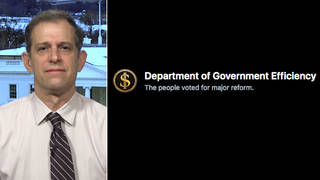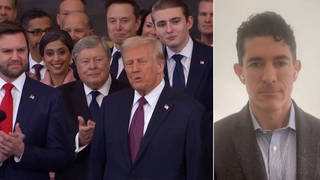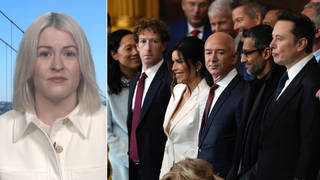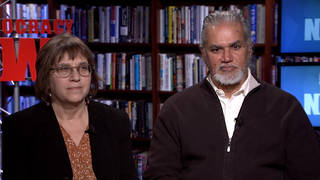
Related
Topics
Guests
- Jeremy Scahillaward-winning investigative journalist, Democracy Now! correspondent, and author of the international bestseller Blackwater: The Rise of the World’s Most Powerful Mercenary Army. His latest article was just published on AlterNet.org. It’s called ”This Is Change? 20 Hawks, Clintonites and Neocons to Watch for in Obama’s White House.
- David CornWashington bureau chief of Mother Jones magazine. He’s just written a piece for the Mother Jones blog called “The Agents of Change on Obama’s Transition Team.”
As speculations abound over who President-elect Barack Obama will name to key cabinet positions, we look at some of the central figures advising Obama, many of whom are leading candidates for posts in the next administration. We speak with Jeremy Scahill, author of the new piece “This Is Change? 20 Hawks, Clintonites and Neocons to Watch for in Obama’s White House,” and David Corn, author of “The Agents of Change on Obama’s Transition Team.” [includes rush transcript]
Transcript
JUAN GONZALEZ: While discussions continue over the possible nomination of Senator Hillary Clinton as the next Secretary of State, President-elect Obama’s transition team announced Wednesday that Tom Daschle, the former Senate Democratic Leader, will be named secretary of Health and Human Services.
As speculation abounds over who President-elect Obama will name to key cabinet positions, we look at some of the central figures advising Obama, many of whom are leading candidates for posts in the next administration.
The website Politico reported last week that thirty-one out of forty-seven people named so far to transition or staff posts have ties to the Clinton administration. Today, we host a discussion on what this means for Obama’s mandate for change.
AMY GOODMAN: Jeremy Scahill is the award-winning investigative journalist, Democracy Now! correspondent and author of the international bestseller Blackwater: The Rise of the World’s Most Powerful Mercenary Army. He has just written a piece that’s been published on AlterNet.org; it’s called “This Is Change? 20 Hawks, Clintonites and Neocons to Watch for in Obama’s White House.” He joins us here in our firehouse studio.
And we’re joined by telephone by David Corn, the Washington bureau chief of Mother Jones. He’s just written a piece on Mother Jones
’s blog called “The Agents of Change on Obama’s Transition Team.”
We welcome you both to Democracy Now! David Corn, let’s begin with you. Who are these agents of change?
DAVID CORN: Well, I looked at the people who have been announced so far who are making up the transition team, those who are conducting the reviews at the agencies. There are about 130 of them. And I’ve noted that a lot of them are exactly the type of people you’d think they’d be, the type of corporate lawyers in Washington who bounce between government jobs and private-sector jobs, you know, some who’ve worked at Fannie Mae, some who’ve worked at corporate law firms, and then they worked at the Senate and then go back and forth. A lot of them used to work in the Clinton administration.
But in addition to those sorts of people on the transition team, I noted there were a bunch of people who have been progressive public policy advocates, academics and other experts, who have spent their whole adult careers devoted to policy making, not necessarily to going between government and private sector and making a bunch of money.
You know, one example is a fellow named Tom Perez, who’s now the head of the Maryland Department of Labor. But while he was a federal prosecutor during the Clinton years, he’s also been a consumer advocate for decades and has worked on a lot of civil rights issues and hate crime issues.
Theodore Shaw is the president of the NAACP Legal Defense Fund and has worked on capital punishment cases and school desegregation cases, affirmative action cases.
And then there’s — you know, just in terms of looking at how this bunch may be different than the Bush bunch, which isn’t hard to do, Sarah Sewall is leading the transition’s national security team. She works at the Carr Center for Human Rights Policy at the John F. Kennedy School of Government. And one of her specialties is the ethics of fighting terrorism. Just think about that for a moment. The ethics of fighting terrorism? That’s probably nothing that got a lot of attention in, say, Dick Cheney’s office. So, again, she is an academic who has worked on and off Capitol Hill but really has devoted her life to working on policy issues.
So, while, you know, we can argue and scream — and I’m not a fan of the possible Hillary Clinton appointment to the State Department — you know, the transition team does include people who are genuine policy advocates, who, if they get a chance to have any authority, could indeed be agents of change.
JUAN GONZALEZ: David, you also mention Pamela Gilbert and Cruz Reynoso also on that. Could you talk about who they are, as well?
DAVID CORN: Sure, sure. And I should say that Pam Gilbert is an old friend of mine. For years, she was the consumer product director at the US Public Interest Research Group, really one of the best consumer advocacy groups in Washington, and then she ran Public Citizen’s Congress Watch for a number of years, which, you know — again, one of the most progressive public interest-oriented organizations on Capitol Hill really trying to hold Congress’s feet to the fire.
Cruz Reynoso is kind of a real hero. He was the first Chicano appointed to serve on the California Supreme Court, late ’70s, early ’80s — I don’t remember exactly when. But he consistently voted against the death penalty while on the court, overturning death penalty sentences. And largely because of that, he became a conservative target. And in 1986, the conservatives mounted a campaign against him, and in California you can vote judges out of office. And he was indeed, with two other members of the California Supreme Court, voted off the bench in 1986. But a few years ago, when President Clinton was in office, he received a Presidential Medal of Freedom, which is, I think, the highest civilian award you can get. So he’s a pioneer and a fellow who was been very courageous in sticking to his principles, and it cost him his job.
So there are a lot of people who — I’m not saying a lot — there are people on the review team, the transition team, who have been motivated by high-minded principles for most of their working careers. It’s not everybody, and we can find plenty of others that raise questions, but it’s good to know that at least there’s some balance here.
AMY GOODMAN: Jeremy Scahill, you’ve written this piece on AlterNet.org that just got published: “This Is Change? 20 Hawks, Clintonites and Neocons to Watch for in Obama’s White House.”
JEREMY SCAHILL: Right. I mean, David is talking about the transitional team that Obama has pulled together that’s working now under John Podesta, Bill Clinton’s former Chief of Staff. And what I’ve looked at in depth is the foreign policy team that surrounds Barack Obama. These are people that are on the transition team or are foreign policy advisers or already have been named to the cabinet or very well may get cabinet positions.
One of the things I think is important to point out here, people have made the point that the Obama house is flush with Clintonites, you know, all of these people that we knew in the 1990s. Some people who were senior advisers to Hillary Clinton jumped onto the Obama bandwagon after Hillary conceded defeat. But what’s important to remember is what 1990s foreign policy looked like, because while Barack Obama campaigned on a pledge to bring change, if you actually analyze US foreign policy from George H.W. Bush through Bill Clinton to George W. Bush, there are great consistencies.
I mean, Bill Clinton’s policies, his foreign policies in the 1990s, really laid the groundwork for much of what President Bush did when he was in office. You had the Iraq Liberation Act, which was passed in 1998, which was the result of a collusion between neoliberal Democrats, neoconservative Republicans. That made regime change in Iraq mandatory. Clinton mercilessly punished the people of Iraq through economic sanctions, the longest sustained bombing campaign since Vietnam. They dismantled Yugoslavia, bombed it. They implemented policies such as the Rambouillet Accord against Milosevic, that was essentially a setup to take away Yugoslavia’s sovereignty, very similar to what Bush did in the lead-up to the Iraq invasion. Clinton hit Sudan. He hit Afghanistan. His free trade globalization policies devastated economies around the world and working people.
And what I point out in my piece is that many of the architects of those policies in the 1990s were not only people who supported the Iraq war in the lead-up and promoted the myth that Saddam had weapons of mass destruction, but they are now at the center of the Obama foreign policy team.
I mean, from the jump, you had Joe Biden. His selection as the vice-presidential candidate was a clear indication that the old guard Democrats were going to be securely embedded in the Obama White House. You know, Biden is — I think one of the experiences in Biden’s life bears particular mention, and that is that Biden was the chair of the Senate Foreign Relations Committee in the summer of 2002, when the Iraq war was being debated. Joe Biden was the man in charge of framing the so-called debate, and he refused to call two witnesses, in particular, who would have thoroughly debunked all of the lies that were being told. One is the former chief UN weapons inspector Scott Ritter. The other is the former head of the UN program in Iraq, Hans von Sponeck. Now, I was with von Sponeck at that time, and we were pressing Biden’s committee to call him to testify. The reason we wanted von Sponeck there is because he had just come back from the north of Iraq and had observed Ansar al-Islam guerrillas, the so-called al-Qaeda presence in Iraq, and would have testified that in fact they were not being trained by Saddam’s government, that they were receiving no assistance, that in fact they were fighting Saddam’s government and were operating from the US-enforced safe haven of northern Iraq, or Iraqi Kurdistan.
Rahm Emanuel, a hardliner on Israel, of course, as we’ve talked about on this program before, also one of the key people in the passage of NAFTA and someone who’s called for a dramatic expansion of the US military.
Madeleine Albright, one of the deans of the Democratic policy elite, whether she gets a post or not in the Obama administration, many of her proteges are some of the key people operating now in the Obama team.
Richard Holbrooke, who of course was one of the point people in the genocide in East Timor under the Carter administration, who also was one of the key figures in dismantling of Yugoslavia and also promoted the myth that Saddam had weapons of mass destruction and, in fact, praised Colin Powell’s fraudulent testimony before the United Nations, saying it was masterful diplomacy.
These are some of the key people there, including Tony Lake. Juan, you know him well.
JUAN GONZALEZ: Yeah.
JEREMY SCAHILL: The former National Security Adviser, deeply responsible for the destruction of Haiti.
JUAN GONZALEZ: Well, Jeremy, those are some of the bigger names, but you also name some others that are less well-known. You mention two: Ivo Daalder and Michele Flournoy, both of whom were associated with the neoconservative Project for the New American Century.
JEREMY SCAHILL: Right. I mean, many of these people — I mean, you have, at the top of the list, you have Dennis Ross, who was both George H.W. Bush and Bill Clinton’s Middle East envoy, and Martin Indyk. Both of them work very closely with AIPAC, as well as the Project for a New American Century.
Michele Flournoy is one of the people that, down the line, may be tapped as the first female Defense secretary, also working with the Project for a New American Century, and in fact authored a paper that is said to have reframed Obama’s perspective on Iraq, backing him off of the total withdrawal rhetoric and looking more at a sort of residual force, downsized, rebranded occupation.
One of the people that David mentions, Sarah Sewall, who comes from the Carr Center at Harvard, in addition to the work that David talked about, we have to remember that Sarah Sewall is someone who has collaborated with General David Petraeus in rebranding American counterinsurgency doctrine. She wrote the introduction to the US Army Field Manual’s republication of the US Army Counterinsurgency Manual. This is a manual that is based on deception, lies, shadow warfare, paramilitary warfare. And she’s been criticized by progressives and other academics for collaborating with the military in developing how to make a better, more effective war machine that also can be spun in human rights circles as, well, softer than that of George W. Bush. I mean, really what we’re talking about here is not just Bush-lite, but an extension of the sort of militaristic, belligerent foreign policy that has been a staple of the US machine for all of our lifetimes.
AMY GOODMAN: David Corn, your response? You have a different take on Sarah Sewall, for example.
DAVID CORN: Well, I do. And I do think that right now, you know, there is cause for concern. But if you look at what Obama said on the campaign trail on the direction he talked about he wanted policy to go in, it is radically different than under the Bush years.
Listen, I was on the frontlines when it came to raising questions about the path to war, and I looked very closely at what Joe Biden did. Now, I don’t defend what Joe Biden did, in terms of what Jeremy said, but again, he had a different position than Hillary Clinton. While Hillary Clinton was off — you know, was basically throttle up, all speed ahead in terms of the resolution, Biden did try — and failed, but he did try to — it mainly was undermined by Dick Gephardt in the House — but he did try to put forward a different resolution that would have made it harder for Bush to have gotten the authority to go to war and that would have been far more deferential to UN inspections and far more supportive. Now, at the end of the day, it didn’t go as far as I would have wanted it to have gone, and of course it didn’t succeed, but there was — there is a degree of nuance, even amongst the old guard. And so, you know — and there are some people who have admitted to making mistakes. There are some people who have talked about how things went wrong and have been more forthright about it than others.
But it’s true. The Democratic policy establishment, by and large, were complicit — were complicit in this war in Iraq. And Obama has clearly made the decision that he — you know, when he picked Biden, for instance, that he wasn’t going to, you know, cut them all out. After all, the party had nominated, four years ago, John Kerry, somebody who had actually voted for that resolution that allowed Bush to invade Iraq. So, you know, I think Obama — you know, everyone talks about how he’s very good at reconciliation — is, you know, not reaching out, but is including these people. But I assume there are other voices, and I do think that it’s a little early to say that because he’s talking to some of these old Clinton hands, who, you know, I debated and fought with during the ’90s about a great many things, that he’s going to be another extension of the George W. Bush policy. I mean, just by saying that one of his key objectives is to shut down Gitmo, right there, that’s, you know, a major change in US foreign policy.
AMY GOODMAN: Jeremy Scahill?
JEREMY SCAHILL: I mean, I think, you know, you have Obama, the orator, and you have Obama’s rhetoric. And then you have what I think is more important, which is who is he surrounding himself with and what are his actual foreign policies. And I know David is intimately familiar with this, but a lot of people who are Obama supporters haven’t actually read the plan.
On the issue of Gitmo, Obama sends one message, but then brings on board as his intelligence transition team John Brennan, who Glenn Greenwald I think rightly described as an advocate of torture, someone who has passionately defended the US extraordinary rendition program, which began under President Clinton, the government-sanctioned kidnap-and-torture program; Jami Miscik, as well, you know, another person who has spoken out in favor of these harsh interrogation tactics, as they’re called. So you have the stated policy, and then you have the people and their track records. And I think history is — best qualifies us to, you know, speak about what’s actually going to happen.
But while he does call for shutting down Guantanamo, there are very hawkish components to the Obama plan. He has credited himself with calling for a surge in Afghanistan and saying that President Bush and John McCain followed his lead. He believes in a paramilitarization of the war on drugs in Central and Latin America. He is not going to shut down these private contractors that have made these offensive wars of aggression possible. His Iraq plan is a downsized, rebranded version of the Bush plan, through his residual force operations.
And then the position that he laid out at AIPAC, where he talked about Jerusalem must remain undivided, that was a speech that was crafted by well-known neoconservatives, and it was messaging to the very right-wing Jewish community in the United States as a way of saying that Obama was going to be pro-Israel. He went further, in fact, than President Bush. You know, he said, well, the US embassy should be in Jerusalem. All the candidates say that, but then saying that Jerusalem must remain — must be undivided, that was further than a lot of Republicans are willing to take it.
And so, you know, I understand what David is saying, and I’m heartened to hear some of the names that David said early on, but we’re talking about heavy hitters who, whether they hold posts or not, are going to have great sway over Barack Obama. And I think that we have to remember, when Clinton first took office, there was not the identical euphoria, but people were glad that Bush was no longer in office, and Clinton turned out to be one of the greatest Republican presidents in history, really setting — co-opting the Republican agenda at times and making possible many of the policies Bush implemented.
JUAN GONZALEZ: David Corn, I’d like to ask you, is it possible this, in essence, what’s going on here is a bifurcating of the movement, that in essence that the Obama campaign is developing a hawkish foreign policy and — while at the same time making changes on domestic policy? A lot of the people that you mention that are progressive are more domestically oriented, with the exception of the financial crisis, which is still to be determined who he’s going to name to run the financial aspect of his administration, but that he could in essence be trying to bifurcate his movement?
DAVID CORN: Well, I don’t think there’s a conscious decision to do that. And I think it’s still — you know, I hate to use cliches here — too soon to tell. Listen, you know, Obama got a lot of grief during the campaign trail for his statement that he wanted to reach out to our enemies and have direct negotiations with heads of states from what some people consider to be thuggish, roguish regimes. And, you know, did he ever run away from that position? No, actually, he stuck by that position. And he had people, some of whom Jeremy has named, come out and defend that position, and even when — you know, even when Hillary and others took shots at him. So if you have — if that becomes a component of his foreign policy, it will be far more progressive than George W. Bush and even Bill Clinton.
Now, we don’t know what’s going to happen, because we haven’t seen him make yet a single decision. And foreign policy is often decided in terms of a reaction to what’s happening out in the world in the first place, when crisis comes along and you see how people respond. When Bill Clinton, you know, bombed Iraq when this spotty intelligence came out that Iraq had tried to kill the first President Bush when he was visiting Kuwait — you know, intelligence and news reports were very, very sketchy — you know, you said, oh, there you go. He’s just going to — he’s afraid not to do this stuff, so he’s going to do this to score political points. And that gives you a good indication of what his foreign policy is going to be and who he’s going to listen to.
And I think we’ll all be looking very closely at some of these first, you know, acts that Barack Obama makes. You know, he has said the priority is to close Gitmo. Regardless of who he’s put on the transition team to talk about intelligence issues, he can be judged according to what he has said — what’s on his to-do list. And if in the first month, two or three, there’s no progress there or he does it in a way that’s problematic, then you can say, look, you know, he’s obviously not sticking to what he said, and he’s probably being influenced by these other folks. But at the same time, if he makes good on some of that stuff —-
And even, you know, I think if he were smart, he’d try to bring John McCain or other people, some Republicans, into that effort to have a bipartisan push to get rid of Guantanamo. That would send a tremendous signal, I think, to the rest of the world. That’s an issue that’s both symbolic and real. It’s real to the hundreds of people who are there, and it’s real to the people, you know, who have been involved from the American side in what goes on down there, who have felt terrible about it, the whistleblowers who you’ve had on your show and you’ve talked to. And, of course, it’s highly symbolic.
So, I mean, you know, I am always guarded. I am not pollyannish about anybody, be they Democrat or Republican. But, you know, I do think that he said some pretty swell things during the campaign, and he’s set the bar high, and he’s set a measure against which he can be judged.
AMY GOODMAN: Jeremy, your last response on this? And also respond to how you identified yourself at the end of this AlterNet.org piece, “This Is Change?”: “Jeremy Scahill pledges to be the same journalist under an Obama administration that he was during Bill Clinton and George Bush’s presidencies.”
JEREMY SCAHILL: Right. I mean, I think -— you know, I pay very close attention to what the independent media are saying and what bloggers and others are saying, and I think what — a sort of disturbing trend is that we have sort of blue-state Fox emerging, where people are, you know, sort of treating Obama in a different way than they would treat Bush or anyone else in power. And I think — remember, when Bush first took power, there was a tremendous outcry over all of these old Reagan hands that were being brought back in and the neoconservatives and others.
I mean, I think the time is now to call the question on the involvement of some of these people, that this is the precise moment when this kind of journalism matters, when we have to remind people of the history and the previous policies implemented by the people that are at the center of Obama’s foreign policy team right now, because we’re going to be living with these people for the next four years running the show. And I think it’s incredibly important to be all over this right now, before they’re named.
AMY GOODMAN: And to those who say it would be hard to find information — to find people who did not work in the Clinton administration with federal government experience?
JEREMY SCAHILL: Well, first of all, you have over 120 members of the House of Representatives who had the foresight to actually vote against the war, and you had twenty-three US senators who voted against the war. And you have Russ Feingold, who voted against the USA PATRIOT Act. And you have former CIA analysts, like Mel Goodman and Ray McGovern, who should be consulted and asked who they think should be running Central Intelligence and be the director of National Intelligence. I mean, remember, Amy, that almost all these people have been on the show. The Obama campaign should look back at Democracy Now!’s archives to find all of these people who were very credible, who actually have been right about US foreign policy — bring them into the fold.
AMY GOODMAN: Well, I want to thank you both for being with us. Jeremy Scahill’s latest piece appears at AlterNet.org, called “This Is Change?” And David Corn, Washington bureau chief of Mother Jones magazine, who writes “The Agents of Change on Obama’s Transition Team” at Mother Jones’s website.












Media Options